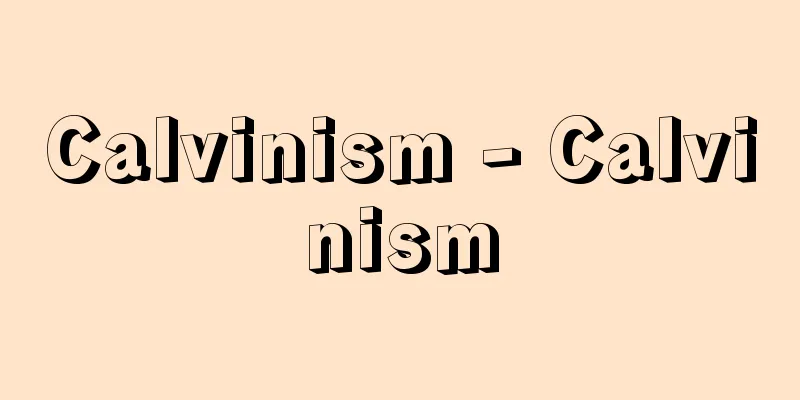Calvinism - Calvinism

|
Protestantism is a philosophy that developed from the theology of Calvin (1509-1564), a religious reformer. The church tradition that originated with Luther is collectively known as Lutheranism, but in reality, there is no church that officially bears Calvin's name. However, Calvin's religious thought has come to form a broad and deep tradition. As a second-generation religious reformer, Calvin learned a lot from the first-generation Luther and Zwingli, and basically agreed with them on the two major principles of "faith alone" and "Scripture alone," but there are reasons why he still tried to seek out the characteristics of Calvinism. In many cases, the central doctrine of Calvin's theology is discussed. Many, including Théodore de Bèze (1519-1605), Calvin's direct successor in Geneva, seek this in predestination, that is, the assertion that some are predestined for salvation and others for damnation. On the other hand, as suggested by the fact that many of Calvin's writings end with the eulogy "Soli Deo Gloria," it is also persuasive to see the central doctrine as "God's sovereignty." Alternatively, in contrast to Luther, it is possible to count Calvin's faithful bibliophily in his close adherence to the Bible text, and furthermore, it would not be wrong to place the idea of God's covenant, which is consistent between the Old Testament and the New Testament, at the center of Calvin's theology, since both are considered to have equal status. In any case, it is nothing but a concrete expression of the two major principles mentioned above. Calvinism has undergone some changes in emphasis over the course of its geographical expansion and the transitions of time. Protestant orthodoxy, which had already begun in Beza and its surroundings, spread to the French Huguenots and the Dutch Reformed, leading to the Arminian controversy, which was finally resolved at the Synod of Dordrecht in 1618-1619. On the other hand, in the Reformed Church in the Palatinate along the Rhine, a tendency to focus on Calvin's covenantal ideas began with Caspar Olevian (1536-1587), author of the Heidelberg Catechism, and Zacharias Ursinus (1534-1583), and in the 17th century, it blossomed and took root as Föderaltheologie in Coetzee in the Netherlands. The concept of Heilsgeschichte (history of salvation) that emerged from this has had a wide and dominant influence up to the present day. In the same 17th century, Calvinism took the form of Puritanism in the Anglo-Saxon lands, including the New World, which aimed to sanctify the whole of life. When this was extended not only to the life of the individual but also to the state and society as a whole, it often came into conflict with the demands of state power and society, giving rise to violent conflicts and even leading to the Puritan Revolution. The Neo-Calvinist movement led by Abraham Kuyper (1837-1920) and others, who were deeply involved in the formation of the modern Western world and attempted to rescue Calvinism, which eventually seemed to be buried within it, and return it to its original form, was one of the factors that led to the current prosperity of Calvin studies. In addition, the dialectical theology of K. Barth and others can also be seen as an effort to revive Calvinism in a broader sense. [Akira Demura January 19, 2018] John T. McNeillThe History and Character of Calvinism (1954, Oxford University Press, New York) [References] | | | | |Source: Shogakukan Encyclopedia Nipponica About Encyclopedia Nipponica Information | Legend |
|
宗教改革者カルバン(1509―1564)の神学から出発し、発展していったプロテスタントの思想。ルターに発する教会的伝統はルター派と総称されるが、カルバンの名を公に付する教会は実際問題として存在しない。しかしカルバンの宗教思想は広く深い伝統を形成することになった。第二世代の宗教改革者としてのカルバンは、第一世代のルターやツウィングリから多くを学び、基本的には「信仰のみ」「聖書のみ」の二大原理においては合致するが、なおカルビニズムの特色を求めようとする努力も理由がないわけではない。 多くの場合、カルバン神学の中心教義は何かという形で論じられる。カルバンのジュネーブにおける直接の後継者T・ベザ(ド・ベーズThéodore de Bèze。1519―1605)を含めて、これを予定論、すなわち、ある者は救いに、ある者は滅びに予定されているという主張にこれを求めることが少なくない。他方、カルバンの著述の多くが「ただ神にのみ栄光あれ」Soli Deo Gloriaという賛辞で終わることに暗示されるように、中心教義を「神の主権性」とみる立場も説得力があることになる。あるいは、ルターとの対比で、聖書本文に密着するカルバンの姿勢から、忠実な聖書主義を数えることも可能であり、さらには『旧約聖書』『新約聖書』の等しい位置づけから、それを一貫する神の契約という理念を中心に据えても誤りではないであろう。いずれにしても、前述の二大原理の具体的表出にほかならない。 カルビニズムは地理的伸張と時代の移行に応じて、強調点にもいくつかの相違がみられる。すでにベザとその周辺に始まるプロテスタント正統主義は、フランスのユグノー派やオランダの改革派へと波及してアルミニウス論争に至り、1618~1619年のドルドレヒト宗教会議でようやく決着をみた。 他方、ライン川沿いのファルツ(プファルツ)侯国の改革派教会では、「ハイデルベルク信仰問答」の執筆者オレビアヌスCaspar Olevian(1536―1587)およびウルジヌスZacharias Ursinus(1534―1583)らに始まって、カルバンのなかの契約思想に注目する傾向が、17世紀に入るとオランダのコッツェーユスにおいて契約神学Föderaltheologieとして開花、定着した。そこから生まれた「救済史」Heilsgeschichteの概念は、現代に至るまで広い支配的影響力をもっている。同じ17世紀のカルビニズムでも、アングロ・サクソンの地では新大陸を含めて、生活全体の聖化を目ざす清教徒主義(ピューリタニズムPuritanism)の形をとり、個人の生のみでなく国家・社会全体にまで広げられるとき、しばしば国家権力や社会の要求と対立し、激しい衝突を生み、清教徒(ピューリタン)革命にまで至る。 近代西欧世界の形成に深くかかわり、ついにはそのなかに埋没したかにみえたカルビニズムを救い出し、原初の姿に戻すことを企図したA・カイパーAbraham Kuyper(1837―1920)らの新カルビニズム運動は、今日のカルバン研究の隆盛を招く一因ともなった。またK・バルトらの弁証法神学も広くみればカルビニズム復興の努力といえるであろう。 [出村 彰 2018年1月19日] 『John T. McNeillThe History and Character of Calvinism (1954, Oxford University Press, New York)』 [参照項目] | | | | |出典 小学館 日本大百科全書(ニッポニカ)日本大百科全書(ニッポニカ)について 情報 | 凡例 |
<<: Calvino - Calvino (English spelling)
>>: Carpini, Giovanni de Piano
Recommend
Berson, A. (English spelling) BersonA
…In 1909, he became director of the Potsdam Magne...
Oreopithecidae
...The Oligocene is a period with few primate fos...
Kugeare - Kugeare
〘 noun 〙 One of the makeup styles in Kabuki. A typ...
"Edo Sangin" - Edo Sangin
He was praised for being "away from the mund...
Trypetimorpha japonica (English spelling) Trypetimorpha japonica
...The red-spotted grasshopper Lycorma delicatula...
Kimura Sho-o
...He continues to be the top Edo gyoji to this d...
Persimmon yokan - Persimmon yokan
…In addition to being eaten as is, kaki is also u...
Cellulitis - phlegmon
Also called cellulitis, phlegmon, or phlegmon. It ...
mean time between failures
…In human terms, this is the average lifespan. (3...
Vanda teres (English spelling)
…[Koichi Ejiri]. … *Some of the terminology that ...
Masayuki Yui (Masayuki Yui)
1605‐51 (Keicho 10‐Keian 4) A ronin military schol...
Jehol
...Emperors stayed here every year from May to Se...
The Gilded Age
…The name, derived from the title of the novel Th...
Aulona
...Population: 74,000 (1990). Founded in the 2nd ...
Jaffa
...Population: 356,000 (1996). Yafo (English name...









